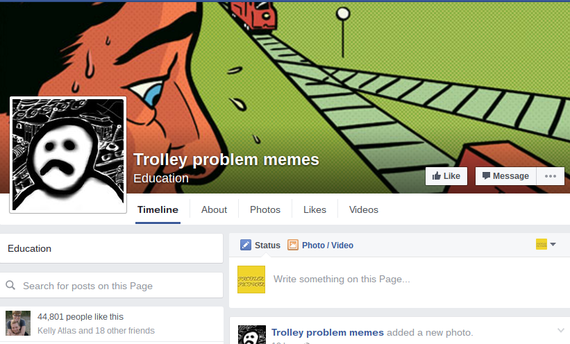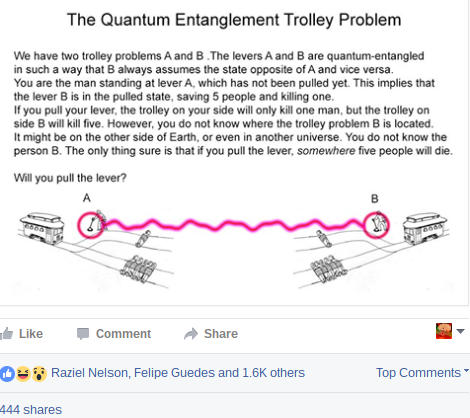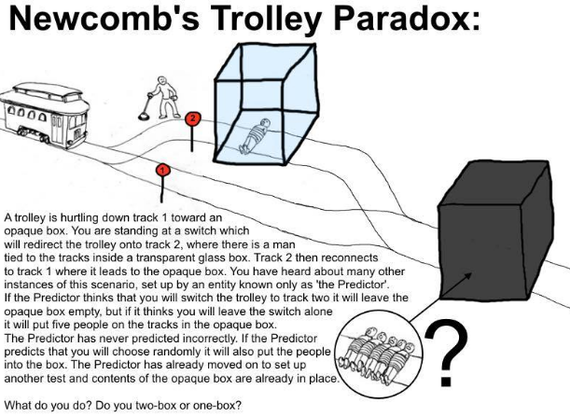The internet is no stranger to sudden bursts of popularity. From the hundreds of millions of views of Rebecca Black's Friday to the million of fans of the science-based stick figure cartoon XKCD, we're quite used to seeing sudden inexplicable jumps in popularity. Nonetheless, it it is still quite surprising to see the explosive growth of Trolley Problem Memes, a page built around variations of a simple ethical thought experiment, little known outside the corridors of academic philosophy.
The basic set-up: There is a runaway trolley barreling down the railway tracks. Ahead, on the tracks, there are five people tied up and unable to move. The trolley is headed straight for them. You are standing some distance off in the train yard, next to a lever. If you pull this lever, the trolley will switch to a different set of tracks. However, you notice that there is one person on the side track. You have two options: (1) Do nothing, and the trolley kills the five people on the main track. (2) Pull the lever, diverting the trolley onto the side track where it will kill one person. What do you do?
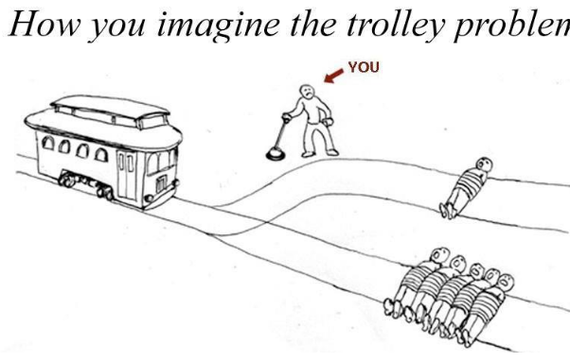
Full Meme Here.
Sounds pretty simple, right? But what if you add a twist? What if, instead of pressing a lever, you had to push a fat man down a bridge in the hopes of stopping a trolley? What if the situation is probabilistic instead of deterministic? What if you could combine questions of epistemology or metaphysics to a seemingly straightforward question of ethics? What if you could reference philosophy, pop culture and history, and add a dash of weirdly macabre humor?
This is the premise of trolley problem memes. You'd think it'd get old really quickly, yet at almost 2 months of age and over 40,000 followers on Facebook, TPM is very much alive and kicking.
It's difficult to overstate just how remarkable this is. As of May 31st, Trolley Problem Memes has 44,020 followers (less than 2 months after its creation). The great utilitarian John Stuart Mill has a mere 25,000 followers, while Peter Singer, arguably the single most famous ethicist today, has just 31,000 likes on Facebook. The Facebook group Utilitarianism has just over 1,000 members, while the philosophically-inclined do-gooder group "Effective Altruism" has about 10,000. Nihilist Memes currently has more followers (763,000 likes), but nihilism has always been more popular among the jaded angsty teen crowd. To put it bluntly, the popularity of Trolley Problem Memes is simply inexplicable.
To attempt to explain the inexplicable, I had a Skype interview with Aljoša Toplak and Haris Sehic, the two young Slovenian creators of Trolley Problem Memes:
Linch: Tell me a little about your background.
Aljoša: We're philosophy students and it's our freshman year,
Haris: We talk a lot about moral dilemmas, our hobbies include reading and making memes. We enjoy a lot of memes, including Monstrous Metaphysics Memes, Nihilist Memes, The Philosophers' Meme, etc., we tag each other in them and joke around a lot.
Linch: When did you first hear about the trolley problem?
Haris: For me I think, it's been sometime last year. There already were some memes around, like the "multitrack drifting" meme.
Aljoša: I can't even remember...it's been long ago. I remember that our philosophy teacher illustrated it for us in high school but I can't really remember if it was the first time. I probably watched a video on youtube about it when I was younger, since I used to be really into watching these educational videos.
Linch: What made you guys first decide to create Trolley Problem Memes?
Aljoša: There was a trolley problem meme on Monstrous Metaphysics Memes, and the top comment said that there should be a page just about Trolley Problem Memes. Then we joked around creating a meme page. I created it and invited Haris to be the other admin. I went back to the meme and commented on it (as the Trolley Problem Memes page): "I'm working on it!" and people followed me to my page.
Linch: Were you guys surprised by how quickly it grew?
Aljoša: We got like 100 likes in the first day (because of the top comment mentioned above), and 2000 in the next 3 days (because I did a really nihilistic one for Nihilist memes and they actually shared it).
Haris: We were surprised how it blew up. It started as a joke. We didn't expect more than 100 people. Within 3 days, there were suddenly 2000.
Linch: Why do you think Trolley Problem Memes is such a popular page?
Aljoša: Well, I know that I'd press like in the first moment I would see it. I mean, it's 'Trolley Problem Memes', there were some memes already and they were hilarious, of course we all wanted more - and when you think about it you see that it can be modificated in so many ways: you can recreate real life events, paradoxes, other famous thought experiments. There are so many possibilities! And when you realize that, how could you NOT like the page? I think that the page was inevitable. Sooner or later it would have to spring up. We can just consider ourselves lucky to be involved in this.
Linch: What's your favorite type of meme?
Haris: Generally I love Classical art memes
Aljoša: Trolley Problem Memes, of course!
Linch: What's your favorite Trolley Problem Meme?
Haris: My fave Trolley Problem Meme is Quantum Entanglement Trolley Problem Meme, because I find quantum physics fascinating.
Aljoša: I love all of them! However, if I had to choose my favourite one, it would have to be the 'Chicken: Trolley Problem Version'.
Linch: Do you have any advice for readers thinking of starting their own meme pages?
Aljoša: Don't do it. Do something productive instead ... No, I'm joking. Just make the memes you want to see. Make the ones you know you yourself would enjoy. Do you think there should be a meme/meme-page out there? Go make it!
Haris: If there are some undeveloped memes that have potential then do it. Make a page. My friend also made a page after we did and it's a fun process.
Linch: Who are some of your (philosophical) heroes?
Aljoša: Well, Diogenes of Sinope is a true hero, of course! Love that guy. Well, and Hume. I just love how he approached every thought of his time. There was a flaw there, and another one there. Something seems odd with contractualism, hmm, our attitude towards induction seems somewhat naive, the problem of free will is no problem at all: in reality we're all agreeing, just our notions of it are different. That man was outstanding. A hero indeed.
Haris:I like a lot of philosophers, one of my favorites is Heraclitus. I also give a lot of thought to the Frankfurt school like Adorno (although he is difficult to read!) and his student Sloterdijk. Philosophy of the 20th century in general is something I enjoy reading. I also like Heidegger and E. Cassirer (mostly because of his broad coverage of history of philosophy thus making him a great intro into other philosophies).
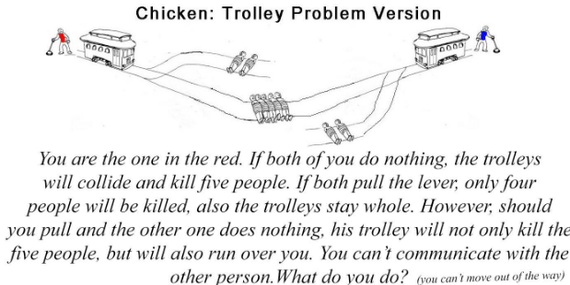
The "Chicken" Trolley Problem Meme
Linch: What are your dreams/ambitions/what do you plan to do after college?
Aljoša: I'm working really hard to achieve the dream of me one day drinking and getting high every day, without a worry in this world. *laughs* I have no idea. I know what I'll eat for breakfast - that's it for now. The future is yet to be revealed. May it be however it wants to.
Haris: For me, I'd like to finish my Master's after my Bachelor's. Though I am not limited to masters' from philosophy. I might take a different Master's program, like maybe physics or law but these are just some options.Though I'll most likely continue with philosophy because it's something I really enjoy. Jobs in philosophy/humanities are very limited. If I'm not a teacher (which is my biggest aspiration), I'd like to go into journalism.
Linch: What do you think are the greatest problems facing our generation?
Haris: Apathy and losing the connection with nature and environment.
Aljoša: Apathy. Maybe loneliness, since that's where society seems to be heading.
Linch: What do you foresee as the future of Trolley Problem Memes?
Aljoša: I see that there's a huge potential for this meme. There are so many options, TPM still might have a long future. We made some memes ... But lately most of the memes come from fans. Every day, we get around 5-10 new memes. There are so many people who got involved in this meme and I love it. This page isn't ours anymore - it belongs to everyone who followed us, is discussing on the posts, even made his own meme and submitted it. So when the night comes and the meme fuel runs low, there will be other people who will come to the rescue with their memes. The meme page will live as long as we all will want it to.
Linch: Do you think of its primary value as entertainment alone, or do you think it can be educational or even enlightening?
Haris: I personally would like trolley problem memes to be even more educational. Like Aljoša said, we get a lot of memes from fans, and a lot of fans study philosophy. I also think that because it's a meme, it has to have a more entertaining aspect to it . But otherwise I think it has a lot of educational use if you're prepared to Google further or explore further.
Aljoša: Yeah, you like see something you don't understand and go explore it just so you wouldn't be excluded from the joke. I guess that we are propagating philosophical knowledge in some way.
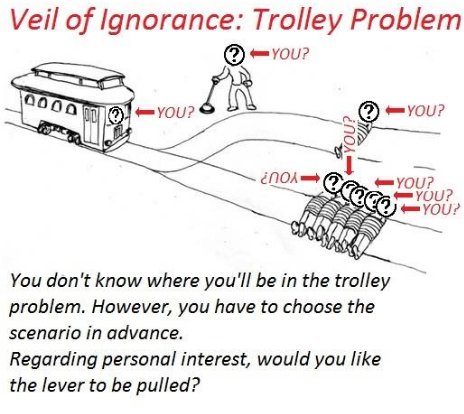
The Trolley Problem Memes take on the Rawlsian Veil of Ignorance. This is expanded on by Aaron Gertler in Utilitarian Thought Experiments.
Philosophy
Linch: Alright, next I'm going to ask you some rapid-fire philosophical questions. Answer as quickly as you can, alright?
Haris: Alright
Aljoša: Alright
Linch: In the standard trolley problem (five straight ahead, one on side track, turn requires switching), do you press the lever?
Haris: Yes, I do.
Aljoša: Yes
Linch: Push the fat man?
Haris: Yeess (in theory)...but in our country it's illegal to push the fat man(=murder). So because of that I would most likely take on a role of a bystander (even if it's just a defense mechanism haha).Also I am not to keen on the idea of actively killing someone.. I still think redirecting the trolley is in a way different from actually pushing someone.. Pushing someone takes everything on a more personal level, there is physical contact and force needs to be used on an actual person,+ there can be a struggle. Pulling the lever is in a way a bit more ignorant and therefore easier? You can think about this for a long time...
Aljoša: Well, first of all, killing is illegal in Slovenia. So I would in theory, but in practice it's complicated. In real life I'll probably chicken out.
Linch: Free Will - Determinism, Libertarianism, or Compatibilism?
Aljoša: Not sure. The deterministic view seems the most probable. The libertarianist's view is a hope. So, until we don't know which one is true, we can pretend that the libertarian is right (imagine accepting determinism in a world where free will does indeed exist!). But we can't know for now. We'll have to wait and hope for the best.
Haris: Libertarianism. Though it's still an interesting and open field for me.
Linch: Newcomb's Paradox: One-box or Two-box?
Haris: Two box
Linch: Save the Drowning Child?
Haris: Yes.
Linch: Is failure to donate to a lifesaving charity like the Against Malaria Foundation morally equivalent to not jumping in the pond?
Haris: I don't think it's the same, because, failure to donate is more of an ignorance issue. You don't see children dying from poverty or diseases. And what we don't see we tend to not think about as much. We stay ignorant.Because if more people are familiar with charities and actual problems and the effects they have, then they would likely donate (more). The jumping in the pond situation is in my opinion a bit different. There is a child drowning right next to you. You are in reach, you can see it happening, it affects you emotionally and directly. I think that a lot of people would save the drowning child but would not donate money. If we can overcome this ignorance then I would say the two are equal. I believe ignorance, apathy and cynicism are some of the things that are too present in our society and should be lightened in a way. I also don't believe humanity should be blamed for this ignorance entirely. I think ignorance like this has its place and is somewhat necessary, though I would support everyone to find a cause they are passionate about and help in any way they can. So I think it's an informational thing, but it's still not entirely the same.
Linch: Is eating meat a problem, morally?
Haris: I do not see a moral problem in eating meat itself. Yet I see a HUGE moral problem in how those animals are treated, tortured and being only disposable things for the cruelty of the meat industry.
Aljoša: I don't really see a problem. Maybe one day I'll see a sufficiently good argument. Right now, no. Maybe I'm just ignorant. I'll have to dive into this issue one day and see what's up.
Linch: So metaethics: Realism or antirealism?
Aljoša: I'm more interested in normative ethics. I'm not qualified to choose for now.
Haris: I'm leaning a lot more towards moral realism.
Linch: What general ethical systems do you subscribe to (eg, Hedonistic Act Utilitarianism, Rawlsianism, Left-Libertarianism)?
Aljoša: Utilitarianism, choosing the greatest good, and more specifically, two-level utilitarianism. Two-level seems like a reasonable answer for now.
Haris: I'm not as strictly an utilitarian as Aljoša, it depends on the situation. Utilitarianism is a fine option with me but it can be very cold and in my opinion should not be strictly taken as a doctrine. I also subscribe to the Golden Rule/Christian ethics which is kind of the opposite of utilitarianism. If somebody on the track is someone I know, I will be less likely to pull the lever. So I think I have quite some deontological considerations, but also subjective considerations that aren't truly universal. It's much easier giving an answer when all the victims are dehumanized illustrations on our page *laughs*.
Linch: What, in your words, is Two-Level Utilitarianism?
Aljoša: Basically, it's leaving your options open between acting the way an act utilitarian or rule utilitarian might.
Linch: Hmm...so why is it correct?
Aljoša: I don't think it's correct; it's just a good heuristic for now. Certainly it's not a correct answer. My position remains open and I'm waiting for some good arguments against it - perhaps that'll be the day I'll change it (Kant wait to start reading Kant again with more precision).
Linch: Is ethics important to you in your day-to-day life?
Haris: I think in contrast with aesthetics which is more subjective, ethics is something that tends towards objectivity. I think ethics is one of the most important fields. In day-to-day life, ethics is one of the things that unite us and is for many philosophers an essential part of leading a good, happy life.
Aljoša: It's the basis of what society of tomorrow should look like. Yeah.
Linch: Do you have any closing thoughts for our readers?
Aljoša: It's pleasing to see that so many people are invested in trolley problem memes, thought experiments, ethics etc. As I said earlier, our page is not just ours, but part of everybody's: people who submitted content, and people who like, share, comment, etc. It's nice to see that people actually care about these questions. Well, thanks for caring! See you on the next meme post tomorrow!
Haris: I like that people are involved, even though it's just on social media. Thanks for sticking with us. Here's to more ethical dilemma memes! *holds an invisible wine glass* Cheers.
---
Aljoša Toplak and Haris Sehic are the two creators of Trolley Problem Memes, a bastion of creativity, philosophy, and Dank Memes. You can follow them on their Facebook page.
Linch is a data scientist-in-training and aspiring effective altruist. He writes about nonprofits and practical ethics. You can follow him on Huffington Post, or check out his other articles here:
The Bystander
One of the Most Prolific Killers in the World Can Be Stopped -- for $2.50
Special thanks to Laura Cerisier for help in taking notes and suggesting questions.

